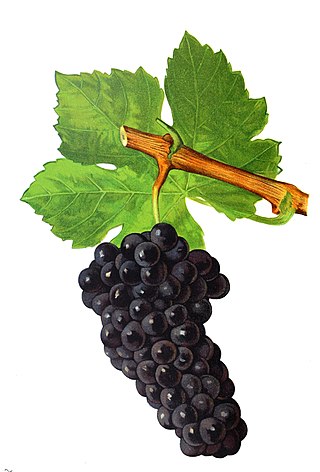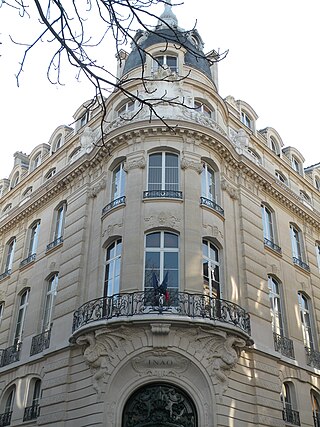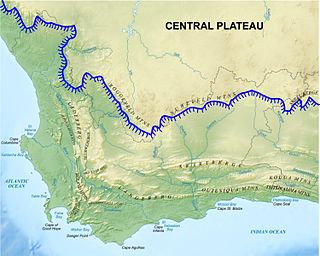
A vineyard is a plantation of grape-bearing vines, grown mainly for winemaking, but also raisins, table grapes and non-alcoholic grape juice. The science, practice and study of vineyard production is known as viticulture. Vineyards are often characterised by their terroir, a French term loosely translating as "a sense of place" that refers to the specific geographical and geological characteristics of grapevine plantations, which may be imparted to the wine itself.

Pinot noir is a red-wine grape variety of the species Vitis vinifera. The name may also refer to wines created predominantly from pinot noir grapes. The name is derived from the French words for pine and black. The word pine alludes to the grape variety having tightly clustered, pinecone–shaped bunches of fruit.

Malbec is a purple grape variety used in making red wine. The grapes tend to have an inky dark color and robust tannins, and are known as one of the six grapes allowed in the blend of red Bordeaux wine. In France, plantations of Malbec are now found primarily in Cahors in South West France, though the grape is grown worldwide. It is increasingly celebrated as an Argentine varietal.

Zinfandel is a variety of black-skinned wine grape. The variety is grown in over 10 percent of California vineyards. DNA analysis has revealed that it is genetically equivalent to the Croatian grapes Crljenak Kaštelanski and Tribidrag, as well as to the Primitivo variety traditionally grown in Apulia, Italy, where it was introduced in the 18th century, and Kratošija in Montenegro. The grape found its way to the United States in the mid-19th century, where it became known by variations of a name applied to a different grape, likely "Zierfandler" from Austria.

Wine Country is the region of California, in the northern San Francisco Bay Area, known worldwide as a premier wine-growing region. The region is famed for its wineries, its cuisine, Michelin star restaurants, boutique hotels, luxury resorts, historic architecture, and culture. Viticulture and wine-making have been practiced in the region since the Spanish missionaries from Mission San Francisco Solano established the first vineyards in 1812.

Paarl is a town with 285,574 inhabitants in the Western Cape province of South Africa. It is the third-oldest city and European settlement in the Republic of South Africa and the largest town in the Cape Winelands. Due to the growth of the Mbekweni township, it is now a de facto urban unit with Wellington. It is situated about 60 kilometres (37 mi) northeast of Cape Town in the Western Cape Province and is known for its scenic environment and viticulture and fruit-growing heritage.

Durif is a variety of red wine grape primarily grown in Australia, California, France, and Israel. Since the end of the 20th century, wineries located in Washington's Yakima River Valley, Maryland, Arizona, Texas, West Virginia, Chile, Mexico's Baja California Peninsula, and Ontario's Niagara Peninsula have also produced wines from Durif grapes. It is the main grape known in the U.S. and Israel as Petite Sirah, with over 90% of the California plantings labeled "Petite Sirah" being Durif grapes; the U.S. Bureau of Alcohol, Tobacco, Firearms and Explosives (ATF) recognizes "Durif" and "Petite Sirah" as synonyms for the same grape. It produces tannic wines with a spicy, plummy flavour. The grape originated as a cross of Syrah pollen germinating a Peloursin plant. On some occasions, Peloursin and Syrah vines may be called Petite Sirah, usually because the varieties are extremely difficult to distinguish in old age.

Viognier is a white wine grape variety. It is the only permitted grape for the French wine Condrieu in the Rhône Valley.

Terroir is a French term used to describe the environmental factors that affect a crop's phenotype, including unique environment contexts, farming practices and a crop's specific growth habitat. Collectively, these contextual characteristics are said to have a character; terroir also refers to this character.

In France, the appellation d'origine contrôlée(AOC) is a label that identifies an agricultural product whose stages of production and processing are carried out in a defined geographical area – the terroir – and using recognized and traditional know-how. The specificity of an AOC product is determined by the combination of a physical and biological environment with established production techniques transmitted within a human community that, together, give the product its distinctive qualities. These crucial technical and geographic factors are set forth in standards for each product, including wines, cheeses and meats. Other countries and the European Union have similar labeling systems. The European Union's protected designation of origin (PDO and PGI) system has harmonized the protection of all geographical indications and their registration. When labelling wine however, producers may still use recognized traditional terms like AOC, and are not required to display the PDO and PGI logos or terms, mostly for aesthetic purposes.

The Cape Winelands District Municipality, formerly the Boland District Municipality, is a district municipality located in the Boland region of the Western Cape province of South Africa. As of 2011, it had a population of 787,490. The largest towns in the municipality are Paarl, Worcester, Stellenbosch and Wellington.

California wine has a long and continuing history, and in the late twentieth century became recognized as producing some of the world's finest wine. While wine is made in all fifty U.S. states, up to 90% of American wine is produced in the state. California would be the fourth largest producer of wine in the world if it were an independent nation.

Constantia is an affluent suburb of Cape Town, South Africa, situated about 15 kilometres south of the centre of Cape Town. It is considered to be one of the most prestigious suburbs in South Africa. The Constantia Valley lies to the east of and at the foot of the Constantiaberg mountain. Constantia Nek is a low pass linking to Hout Bay in the west. Constantia is a beautiful family orientated place for families to grow, with the leafy canopies of trees and top schools.

Durbanville is a town in the Western Cape province of South Africa, part of the greater Cape Town metropolitan area. Durbanville is a semi-rural residential suburb on the north-eastern outskirts of the metropolis surrounded by farms producing wine and wheat.
Napa Valley is an American Viticultural Area (AVA) located in Napa County in California's Wine Country. It was established by the Bureau of Alcohol, Tobacco and Firearms (ATF) on January 27, 1981. Napa Valley is considered one of the premier wine regions in the world. Records of commercial wine production in the region date back to the nineteenth century, but premium wine production dates back only to the 1960s.

Western Cape is a Geographical Unit within the Wine of Origin classification system of South African wine. Corresponding to the province of Western Cape it includes most of the vineyards in South Africa.

Mexican wine and wine making began with the arrival of the Spanish in the 16th century, when they brought vines from Europe to modern day Mexico, the oldest wine-growing region in the Americas. Although there were indigenous grapes before the Spanish conquest, the Spaniards found that Spanish grapevines also did very well in the colony of New Spain (Mexico) and by the 17th century wine exports from Spain to the New World fell. In 1699, Charles II of Spain prohibited wine making in Mexico, with the exception of wine for Church purposes. From then until Mexico’s Independence, wine was produced in Mexico only on a small scale.

The Boland is a region of the Western Cape province of South Africa, situated to the northeast of Cape Town in the middle and upper courses of the Berg and Breede Rivers, around the Boland Mountains of the central Cape Fold Belt. It is sometimes also referred to as the Cape Winelands because it is the primary region for the making of Western Cape wine.
















